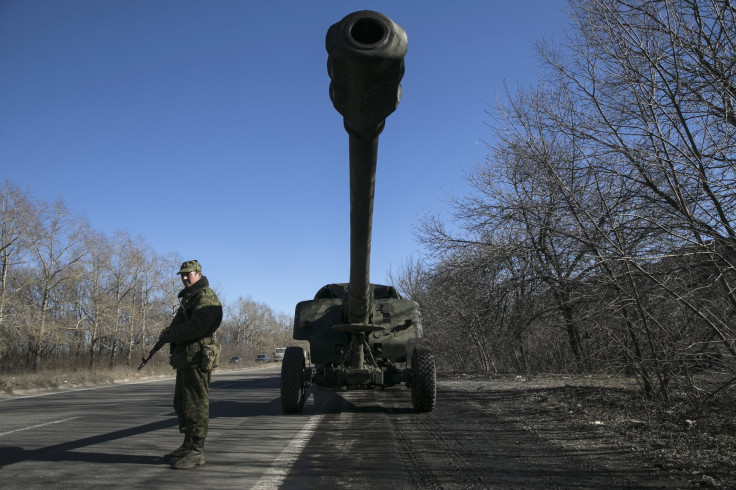Pro-Russian Rebels Are Winning The East Ukraine War, But When Will They Stop?

Despite a ceasefire that officially came into force on Feb. 15, fighting between Ukrainian troops and pro-Russian forces in the Donbass region of Ukraine has continued and the rebels have gained more ground. The withdrawal of ill-equipped Ukrainian forces from the strategic city of Debaltseve on Feb. 18 and the encroachment by pro-Russian forces on the port city of Mariupol in the south suggest that the rebels are continuing their onslaught in eastern Ukraine. They are winning, experts say. And they may not be done advancing.
“[Alexander] Zakharchenko, the so-called prime minister of Donestsk People’s Republic, said after they took Debaltseve they plan on taking all of Luhansk and all of Donetsk,” said Steven Pifer, who was U.S. ambassador to Ukraine from 1998 to 2000, referring to two eastern regions bordering Russia. “Some have speculated that the Russians might continue on to the point where northern Crimea connects to the Ukraine mainland.”
Capturing Mariupol would go some way toward creating a land bridge between Crimea, which Russia unilaterally annexed in March 2014, and mainland Russia. That would involve rebel forces first taking Mariupol and then moving west a further 200 miles (300 km) toward Crimea, at which point, Pifer said, they would likely encounter stronger resistance from the Ukrainian army and armed partisan groups that have been preparing for war.
But Russia may not back such a gutsy move, aware of the liabilities it would carry. “I think the Russians understand that going beyond where they are now could become much more costly, both in terms of Russian casualties and both in terms of sharper international reaction,” Pifer said.
Sanctions imposed on Russia have done little to deter it from supporting the rebels with tanks, artillery, missile systems and troops. Even after the ceasefire was signed, NATO said Russia was continuing to supply rebel forces with advanced weaponry.
When the conflict began in April last year, many observers said Russia was attempting to replicate what it achieved with the war with Georgia in 2008: a "frozen conflict," which succeeded in halting Georgia's bid to forge closer ties with the West and possibly join the European Union and NATO.
It's unclear what Russian President Vladimir Putin wants to achieve if a frozen conflict in Ukraine is what he wants, wrote William Harrison Courtney, the U.S. ambassador to Kazakhstan from 1992 to 1994 and Georgia from 1995 to 1997, in a RAND corporation blog. “Moscow's goals in these conflicts appear to include restoring hegemony in its neighborhood, preventing inroads by the North Atlantic Treaty Organization and the European Union, and buttressing support at home for the leadership,” he wrote.
The resistance from Ukraine to the rebel forces that Putin is arming to further those goals has been weak, with poorly equipped forces using Soviet-era weapons. There is a possibility, however, that the U.S. could offer lethal aid should the conflict continue to deteriorate. The topic has been brought up in Congress numerous times, but there is no indication the White House is about to consider it. Hawks led by Sen. John McCain, R-Ariz., are calling for immediate lethal assistance to the Ukrainian army; McCain even said he was “ashamed” of his country for not acting sooner.
The Pentagon refused to comment for this story on whether it had made a decision to offer lethal aid on top of the nonlethal aid it is already supplying to Ukrainian forces.
On Tuesday the United Kingdom also pledged nonlethal support to Ukrainian forces. Prime Minister David Cameron announced British military personnel would be advising and training Kiev's government troops in the coming weeks. Almost 6,000 people have now died in the war.
European leaders have responded to Russia's intervention with sanctions aimed at individuals within the Russian and pro-Russian hierarchy, but also Russian business and banking interests. While the measures have contributed to a crisis driven by falling oil prices that has almost brought Russia to the brink of recession, Putin has persisted in his intervention in Ukraine.
“I think the West is really struggling to bring about true deterrence,” said Sarah Lain, a research fellow and expert on Russia and the former Soviet Union at the Royal United Services Institute, a London think tank. “Putin has never been one to bow to external pressure, and he’s demonstrated that in the face of sanctions, which is really the only thing Europe is willing to do."
© Copyright IBTimes 2024. All rights reserved.






















